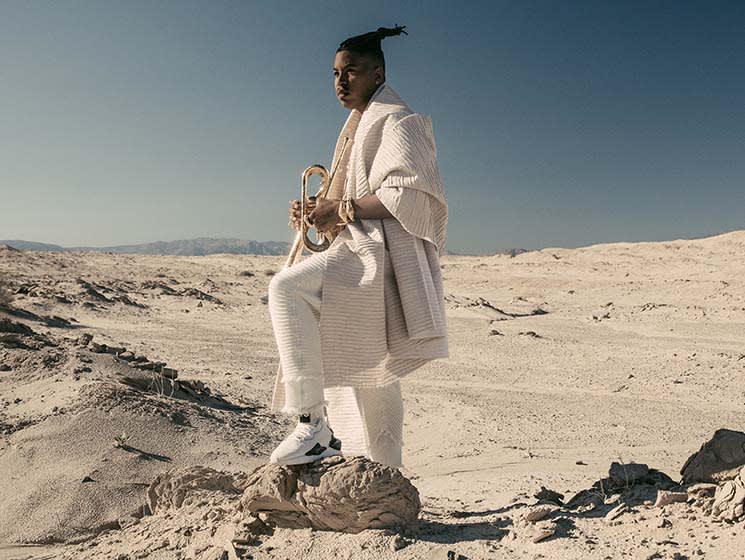With his new album Ancestral Recall, Christian Scott aTunde Adjuah is on a mission to free your mind. Tracing the sonic unity between West African, Indigenous and African/diasporic rhythms and their roots in trap, hip-hop and modern templates, Ancestral Recall is Adjuah's expedition to decolonize sound and eliminate cultural and sonic barriers among listeners.
"There are a lot of tensions that become heightened based on how we get music, or how it's been disseminated to us," Adjuah says. "The idea behind this project is to take those sort of ideas and use them in means that they've never been used before, to unify people. So the identity politics and the sound of this record — the cultural sound of this record — are very pointed.
"A lot of times, historically, when we talk about our differences, it's very rare that you get that 'kumbaya' moment when talking about what makes a group of people unique," he continues. "Because of the value distinctions that we draw when illuminating those differences, a lot of times those can create tension, and some things that don't really help. So part of what we want to do is to take the things that traditionally make people sort of break off or branch off from each other. We're taking the identity politics and turning that on its ear and using that as a means of unifying people, as opposed to being a segregating agent."
Stretch Music, in 2015, and 2017's Grammy-nominated The Emancipation Procrastination — not to mention appearances on albums by Prince, Marcus Miller and on Boogie's latest hit "Whose Fault" — established the 35-year-old New Orleans born-and-bred trumpeter in the vanguard of new missionaries. Along with Robert Glasper (Adjuah's bandmate in supergroup R+R=Now) and Kamasi Washington, Adjuah is part of a younger generation that has been embracing and furthering jazz over the past decade-and-a-half.
Given its theme of unification, it's ironic that the recording process for Ancestral Recall was a much less collaborative effort, eschewing the group dynamic and interaction of Adjuah's previous albums.
"This record is completely different, in that probably 80 percent of the record is me and my home recording, or at Camp Dave, one of the recording studios that we used here in Los Angeles. You've got a lot of the horns and drum and percussions that you hear actually coming from me playing a logic organ and box computer programs, or me playing the pad and all of these digital instruments, with some traditional instruments, creating all of those elements of drumming and the sonic texture of the record.
"There's a lot more trumpet on this record than most of my records. It's really different in that this record is more of a literal transcription of what I hear and what happens in my mind, sonically."
"There are a lot of tensions that become heightened based on how we get music, or how it's been disseminated to us," Adjuah says. "The idea behind this project is to take those sort of ideas and use them in means that they've never been used before, to unify people. So the identity politics and the sound of this record — the cultural sound of this record — are very pointed.
"A lot of times, historically, when we talk about our differences, it's very rare that you get that 'kumbaya' moment when talking about what makes a group of people unique," he continues. "Because of the value distinctions that we draw when illuminating those differences, a lot of times those can create tension, and some things that don't really help. So part of what we want to do is to take the things that traditionally make people sort of break off or branch off from each other. We're taking the identity politics and turning that on its ear and using that as a means of unifying people, as opposed to being a segregating agent."
Stretch Music, in 2015, and 2017's Grammy-nominated The Emancipation Procrastination — not to mention appearances on albums by Prince, Marcus Miller and on Boogie's latest hit "Whose Fault" — established the 35-year-old New Orleans born-and-bred trumpeter in the vanguard of new missionaries. Along with Robert Glasper (Adjuah's bandmate in supergroup R+R=Now) and Kamasi Washington, Adjuah is part of a younger generation that has been embracing and furthering jazz over the past decade-and-a-half.
Given its theme of unification, it's ironic that the recording process for Ancestral Recall was a much less collaborative effort, eschewing the group dynamic and interaction of Adjuah's previous albums.
"This record is completely different, in that probably 80 percent of the record is me and my home recording, or at Camp Dave, one of the recording studios that we used here in Los Angeles. You've got a lot of the horns and drum and percussions that you hear actually coming from me playing a logic organ and box computer programs, or me playing the pad and all of these digital instruments, with some traditional instruments, creating all of those elements of drumming and the sonic texture of the record.
"There's a lot more trumpet on this record than most of my records. It's really different in that this record is more of a literal transcription of what I hear and what happens in my mind, sonically."
